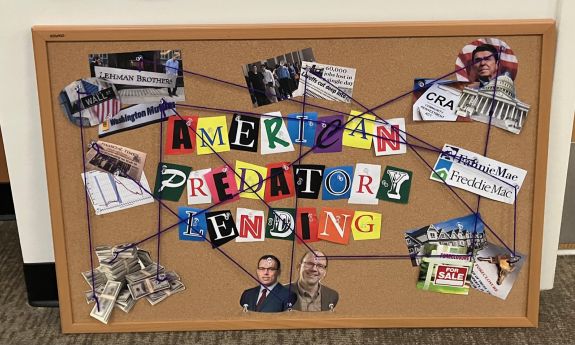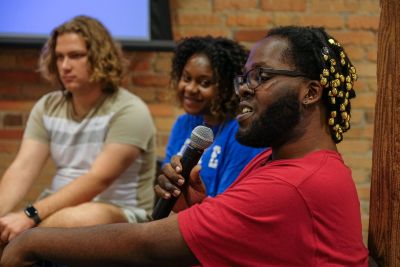Beyond Textbooks: How Students Create Connection Through Narrative

The students worked in small teams on their projects, reinforcing the idea for students that research is usually collaborative, said Brown. “All research rests on the efforts of many,” she said.
Graduate students served as team mentors. That “intergenerational structure,” bringing together graduate and undergraduate students, is one of the programs most important assets, said Nikki Locklear, former Story+ graduate mentor and graduate assistant for the program this summer.
Teams presented their findings of this year’s projects at a symposium in June:

Category is … Hoopskirt Extravaganza: This project asked students to study the hoopskirt of the antebellum era. Students designed, sewed and modeled hoopskirts for this project, culminating in a fashion show — complete with a runway and music. The results were a mix of Ru Paul combined and edgy Southern Belle.
Participants said the project forced them to think about the body as a critical site for study. When you wear a hoopskirt, “the way you do things changes,” noted student Antwaine Ellison. “You can’t sit. You feel the pain of a hoop skirt.” In crafting hoopskirt designs for the 21st century, students considered the untold stories of the people who made and wore the hoopskirts of the 19th century.
Commemorating Duke: 100 Years: Students selected and wrote labels for 100 items representing Duke’s history — compiling them for an exhibit. A few highlights included the original plate for Duke’s alma mater, written by senior Robert James (1924); the 2007 media guide for the Duke women’s golf team; and a 1962 “Design for Duchess” handbook, which gave women advice on dating and what to wear to the gym. (It advised women to wear a coat until they got to the gym, for modesty.)
In choosing the artifacts as a group, student Zoe Tishaev said, “We realized that we face a lot of the same issues today that students faced in the past.”
Duke Campus Farm: Growing Histories: Working and learning at Duke’s one-acre Campus Farm — which provides produce and food education to local communities – helped students appreciate conducting their research through different lenses, including a culinary view. It also taught them the histories of the different crops at the farm, such as cucumbers and fennel.
“We got different ideas of what an archive could be,” said student Jackson Garvey, with soil samples just as valid as a primary, archival document.
50 Days of Kindness: Sharing Wisdom Learned During Incarceration: “You hear about individuals who are arrested and go to prison, but you often don’t hear about these people after they go to prison,” said student Sonia Green. This project allowed students to go beyond statistics of the incarcerated and learn their personal stories via the work of the Human Kindness Foundation, an organization that aims to “promote spirituality, mindfulness and wellness for people experiencing incarceration and their families.”
Students compiled artwork, letters and narratives collected from the foundation and organized them by theme, such as dealing with anger, and forgiveness, for a multimedia project aimed at those who have experienced incarcerated and their families.
American Predatory Lending Podcast: This Story+ team researched the causes of the 2008 housing collapse through oral interviews of players in the financial and real estate worlds, as well as policy makers. The goal was to produce a podcast series, for college students, that explores key themes of the crisis.
With a database of interviews from a larger Bass Connections’ American Predatory Lending project, the team used key words to search for and categorize quotes from the different actors, noting that it was especially important for them to humanize the homeowners by putting their stories into the podcast. By exploring and sharing these narratives, “we wanted to help our generation better determine the future,” said Karianna Klassen, participant and research assistant for American Predatory Lending project.
Healthy Women Post Roe v. Wade: Students worked on providing objective information about reproductive healthcare for women in a post-Roe environment. The students created short social media and podcast pieces drawing on an archive of interviews with Duke OBGYNs and family practitioners that came out of history research professor Wesley Hogan’s spring 2023 course, Documenting US Women’s Health Post Roe v. Wade.
The students said they wanted to recover care for those who have lost it – with a range of material, from statistics busting myths on teenage pregnancy to safe ways to track periods (on Instagram and Facebook).